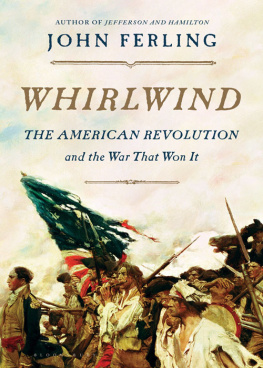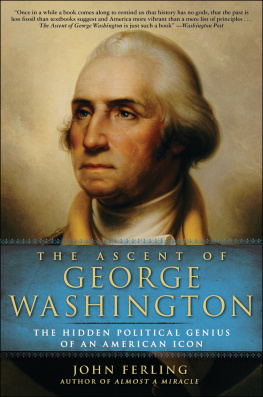Ferling - A leap in the dark : the struggle to create the American republic
Here you can read online Ferling - A leap in the dark : the struggle to create the American republic full text of the book (entire story) in english for free. Download pdf and epub, get meaning, cover and reviews about this ebook. City: New York, États-Unis, Oxford, United States, USA., United States, year: 2003, publisher: Oxford University Press, genre: Politics. Description of the work, (preface) as well as reviews are available. Best literature library LitArk.com created for fans of good reading and offers a wide selection of genres:
Romance novel
Science fiction
Adventure
Detective
Science
History
Home and family
Prose
Art
Politics
Computer
Non-fiction
Religion
Business
Children
Humor
Choose a favorite category and find really read worthwhile books. Enjoy immersion in the world of imagination, feel the emotions of the characters or learn something new for yourself, make an fascinating discovery.

A leap in the dark : the struggle to create the American republic: summary, description and annotation
We offer to read an annotation, description, summary or preface (depends on what the author of the book "A leap in the dark : the struggle to create the American republic" wrote himself). If you haven't found the necessary information about the book — write in the comments, we will try to find it.
In A Leap in the Dark, John Ferling offers a magisterial new history that surges from the first rumblings of colonial protest to the volcanic election of 1800. Ferlings swift-moving narrative teems with fascinating details. We see Benjamin Franklin trying to decide if his loyalty was to Great Britain or to America, and we meet George Washington when he was a shrewd planter-businessman who discovered personal economic advantages to American independence. We encounter those who supported the war against Great Britain in 1776, but opposed independence because it was a leap in the dark. Following the war, we hear talk in the North of secession from the United States. The author offers a gripping account of the most dramatic events of our history, showing just how closely fought were the struggle for independence, the adoption of the Constitution, and the later battle between Federalists and Democratic-Republicans. Yet, without slowing the flow of events, he has also produced a landmark study of leadership and ideas. Here is all the erratic brilliance of Hamilton and Jefferson battling to shape the new nation, and here too is the passion and political shrewdness of revolutionaries, such as Samuel Adams and Patrick Henry, and their Loyalist counterparts, Joseph Galloway and Thomas Hutchinson. Here as well are activists who are not so well known today, men like Abraham Yates, who battled for democratic change, and Theodore Sedgwick, who fought to preserve the political and social system of the colonial past. Ferling shows that throughout this period the epic political battles often resembled todays politics and the politicians--the founders--played a political hardball attendant with enmities, selfish motivations, and bitterness. The political stakes, this book demonstrates, were extraordinary: first to secure independence, then to determine the meaning of the American Revolution.
John Ferling has shown himself to be an insightful historian of our Revolution, and an unusually skillful writer. A Leap in the Dark is his masterpiece, work that provokes, enlightens, and entertains in full measure
Ferling: author's other books
Who wrote A leap in the dark : the struggle to create the American republic? Find out the surname, the name of the author of the book and a list of all author's works by series.





